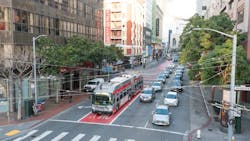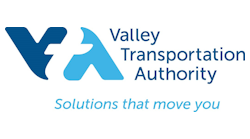Bay Area’s Regional Network Management Council recommends $18 million in BusAID program funding
The Regional Network Management Council, made up of Metropolitan Transportation Commission’s executive director and general manager-level representatives of Bay Area transit agencies, approved approximately $18 million in funding for eight near-term transit priority projects across California as part of the $30 million Bus Accelerated Infrastructure Delivery (BusAID) program. The Regional Network Management Committee will vote on funding these projects in May.
The BusAID program is a Transit Transformation Action Plan initiative to reduce transit travel times and improve transit reliability. BusAID emphasizes quick-build solutions at problem “hotspot” locations identified by transit agencies. The eight projects recommended for full or partial funding are expected to be completed during the next one to three years and include:
Park Street Transit Signal Priority & Signal Optimization (Alameda)
- The project spans Park Street from Alameda Avenue to Otis Drive. It will install transit signal priority and optimize signal timing at four signalized intersections along the congested Park Street corridor.
- Once complete, AC Transit routes 20, 21, OX and 663 will benefit from reduced signal delays.
International Boulevard Transit Lane Delineation (Oakland)
- The project spans International Boulevard from 14th Ave. to 42nd Ave. It will install vertical treatments between the existing bus lanes and general-purpose lanes and add red paint to the existing bus lanes to deter non-transit vehicles from using the bus lanes.
- Once complete, AC Transit route 1T (Tempo) will benefit from reduced delays, and corridor safety will be improved by discouraging speeding.
Monument Corridor Transit Speed Improvements (Concord)
- The project spans Monument Boulevard between Detroit Avenue and Mohr Lane. It will install transit signal priority, as well as relocate and reconfigure bus stops to increase accessibility and ensure efficient transit operations.
- Once complete, County Connection routes 11, 14, 16, 311, 314, 611, 613, 616 and 619 will benefit from more reliable service and reduced travel times.
El Camino Real Bus Boarding Islands & Bus Stop Balancing (Redwood City)
- The project spans El Camino Real from Whipple Avenue to Dumbarton Avenue. It will fund the planning and design of bus boarding islands at stops in Redwood City and unincorporated North Fair Oaks.
- The project will reduce delay for SamTrans routes ECR, 79, 270, 278, 295, 296, 296O and 397 by enabling buses to serve stops in-lane.
K-Ingleside Rapid Project Ocean Avenue Quick Build (San Francisco)
- The project spans Ocean Avenue from Junipero Serra Boulevard to Geneva Avenue. It will install lengthened and widened boarding islands at stops, add red transit lanes and implement signal timing modifications and turn restrictions at several intersections.
- Once complete, the San Francisco Municipal Transportation Agency K-Ingleside light-rail line will benefit from decreased travel times and increased service reliability.
Alvarado-Niles Road Part-Time Transit Lane Pilot (Union City)
- The project spans Alvarado-Niles Road from Decoto Road to Almaden Boulevard. It will install a two-year part-time transit lane pilot, providing buses with a dedicated lane during hours with peak traffic congestion.
- Once complete, Union City Transit routes 1, 3 and 5 and AC Transit route 97 will benefit from reduced delays due to traffic congestion.
Vision Zero East San Jose Safety Corridor Project for Senter Road (San José)
- The project spans Senter Road from Story Road to Monterey Road. It will reduce delays to buses by installing bus boarding islands at stops, enabling buses to serve stops in-lane.
- Once complete, this project will reduce delay for Santa Clara Valley Transportation Authority (VTA) routes 70, 72 and 73.
Cloud-Based Transit Signal Priority at 174 Intersections along VTA’s Frequent Network (San José)
- The project will be implemented at 174 intersections in the city of San José. It will install next-generation (cloud-based) transit signal priority to reduce delay to buses along VTA's Frequent Network.
- Once complete, numerous VTA routes — notably routes 25, 26, 61, 64A, 64B, 70, 71, 72, 73, 77 and 500 — will benefit from reduced signal delays.
Project recommendations were developed based on a two-stage screening process that evaluated potential rider benefits (time savings), equity considerations and project feasibility and readiness. All projects will include pre- and post-implementation evaluation to quantify project benefits. The remaining balance of $12 million is being reserved for future rounds of BusAID funding when additional projects are identified and become ready for implementation.


